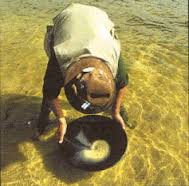Gold was ever formed together with quartz crystals in veins of volcanic rock.
 Sometimes gold crystals are also found in auriferous sand and stone pieces.
Sometimes gold crystals are also found in auriferous sand and stone pieces.
Worn away by erosion may it end up in rivers. These deposits (placers) can get buried under the surface later. An example is the famous gold ores of the Witwatersrand in South Africa.
Typically, gold is found as fine grains in rocks. In order to be visible to the naked eye, the ratio of gold in the ore must be more than 30 mg / kg (30 ppm). Usually, gold will not be visible in the ore of gold mines.
Because of the value that people attributed to gold, it was used as early payment. In Egyptian hieroglyphics from the 26th century BC. has been mention gold as payment.
Gold is now widely used in electronics (printed circuit boards, contacts).
Pure gold is a dense but soft metal. A block of 1 gram of gold can be crushed and rolled into a sheet of gold leaf with an area of 1 square meter.
It is mixed with other materials to make it harder.
The content of gold in jewelry is measured in carats, pure gold is 24 carats. Also common are 14 karat (58.3% gold), 18 karat (75%) and 22 karat (91.7%). Roughly one carat is about 4% pure gold.
For a ring of 10 grams with a content of 18 carat is created 18,000 kg of waste.
Rock grinding is by the large power consumption one of the most expensive steps in freeing up valuable minerals.
Often therefore gold from not coarse grinded ore is resolved. Well-known gold mining methods use toxic sodium cyanide or also toxic mercury to first solve the gold with ecological catastrophically result.
Attempts and rumors to mine gold in deposits have already led to a gold rush in all parts of the world.
Another method of gold mining includes washing of soil, gravel and / or river silt.
Gold is heavier than sand and pebbles. First you scoop in a sieve coarse sand (under (running) water). The fine sand that remains goes in the gold pan. With some water at the mixture in the pan you let it turn around gently and wash away sand and pebbles over the edge. Again add water and repeat.”Panning" may with wild movements, because gold is heavy, it always sinks to the bottom.
Until at the end – with a bit of luck- remain the heaviest grains (gold so).
If you have fast flowing water, you can also use a sluice box (a kind of cascade filter). The lighter particles flow with the water off, the heavier sediment in ridges raised from the bottom plate. Sludge you can further wash out later.
The river itself is also working as a filter. The find probability is higher in pits. A straight line between two inside corners is a "golden path". Finding of iron and other metals may indicate the presence of gold.
The ancient Greeks known the technique to catch gold. They laid wool sheepskins in rivers, so that gold particles were allowed to settle between the wool. On this is probably the legend of the Golden Fleece based.
In Belgium, it is forbidden to look for gold in rivers. In France you need a written permission from the government. In Italy, Australia and the United States it’s allowed.In Australia are found in the desert hundreds of kilograms with metal detectors every year.
Also in the Low Countries was gold found around the massif of Stavelot, around Amblève valley.
Between 1802 and 1833 gold (0.40 gr. gold per ton) was mined in the 'Heid de la Mine d'Or' at Quarreux near Remouchamps. The richness of the Celts before and during Roman times would also stem from the Ardennes.
In Limburg, in the small rivers is also found gold (ie the Geul).
A whole day of intensive searching a river may deliver you two hundred gold flakes, five tenths of a gram. For that you barely get one euro.
Yet there are many fans who do this as a hobby. Worldwide, the alluvial miners are united in the World Goldpanning Association. Even championships are organized.
One tonne of mined gold ore contains 3 grams of gold. One tonne of recycled mobile phones contains 300 grams of gold. (And 40 other metals, including several valuable.) Of 200 old mobile phones you can make a golden ring.
Golden handshake: a reward for unproven services. (Alexander Pola)
